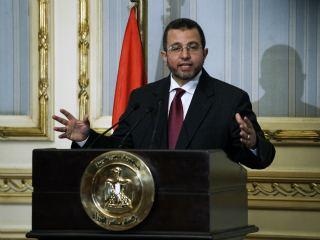CAIRO: Arab and German bloggers gathered in Cairo for the Young Media Summit (YMS) last week to explore the role of social media in the Arab uprisings. The summit is the second in a row to promote dialogue between Arabs and Germans through blogging.
"YMS kicked off in Cairo in 2010 but it came back this year to investigate reform and social media after the revolution," Zahi Alawi, YMS organizer, told Daily News Egypt. It is expected to take place in another country next year.
The program facilitates exchange and networking among young media professionals from the Arabic-speaking world and Germany. The summit is organized by Deutsche Welle’s DW-Akademie and the German Information Center and funded by the German Federal Foreign Office.
A visit to Tahrir Square was on the itinerary.
Eighteen bloggers, including three Egyptians, six Germans and nine Arabs, spoke to people on the street, shot videos and took photos of post-revolution Egypt. The team was divided into groups of three to blog their activities on the YMS blog.
"Looking at graffiti, Tahrir spirit came to me and I felt the youth’s inspiration and freedom in expressing their thoughts. Art says it all," said Maha Al-Sarraj from Saudi Arabia. Al-Sarraj was touched by Ahmed Bassiouny’s story, an artist killed on January 28.
Before the revolution, Al-Sarraj said, spirits were down; there was no hope in the future and people were trying to adapt to their destiny. But now, the revolution brought on a peaceful spirit, she said.
The young Saudi blogger and TV presenter found no comparison whatsoever between Egypt and Saudi Arabia.
"Why should we revolt? We have no poor people, we have some issues which can be solved through dialogue and not by force," she said.
Driving is one of the issues that is not up to the government to solve, Al-Sarraj said. "Driving isn’t a life or death issue. I cannot destroy my economy and sacrifice my country to be able to drive especially when the problem lies within the religious people’s mentality … gradual change is the only way out," she added.
The Saudi King made big changes in favor of women during his tenure. "He’s treating us like a father," Al-Sarraj told DNE.
Hannah Wettig, German blogger and leftist journalist, went to investigate sexual harassment after the revolution. She spoke to Coptic girls and discovered that they can be subjected to kidnapping and forced into prostitution just like Muslim girls reflecting a general disrespect for women rights. "I thought it was a sectarian issue but it’s not," Wettig said.
Wettig recounted political discussions she witnessed in downtown coffee shops between what she said were Salafi men and secular women. At the same time, she said this new atmosphere is lively and free. “Feels like Beirut to me," she added.
However, Wettig said the current political situation is difficult. "Egypt needs so much work as the economic crisis expands. There are hints that a military dictatorship is possible and the Muslim Brotherhood cooperating with the old regime. It’s difficult for the newly established political parties. I’m afraid the revolution won’t achieve its results," she noted.
Four months after the revolution, Bassem El-Hady, cofounder of TEDxCairo, worked with his Tunisian colleague at YMS to investigate the changed behaviors. "Egyptians are very sociable and like to interact, share and discuss things. We are also emotional so we’re easily affected by what we see online. You just add your posts to a wide pool of things happening in Egypt so that every citizen is part of the community," he explained.
Today, El-Hady said, even vendors on the street know what Facebook is even if they don’t know what it looks like or how it functions.
Instead of following the mainstream media, people turned to Facebook and Twitter to follow a whole army of bloggers on the ground. "I could get the real story from bloggers who are witnesses to what’s happening adding their feelings and impressions which don’t appear in mainstream reporting. That’s more compelling," said Amira El-Hussainy, Global Voices Online’s MENA editor.
"It’s very touching for me to be in Tahrir now after following its news through social media during the revolution," El-Hussainy said. "Egypt gathered bigger momentum and larger interest than Tunisia and you managed to get rid of a self-installed pharaoh, it’s a priceless feeling," she noted.
Wanting to be part of it, today, El-Hussainy went to Tahrir Square with other participants of the YMS and recreated some of the chants used during the 18-day uprising.

